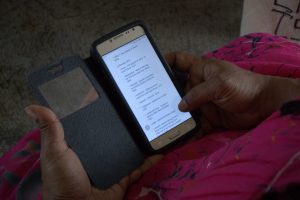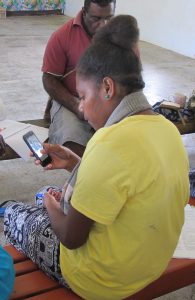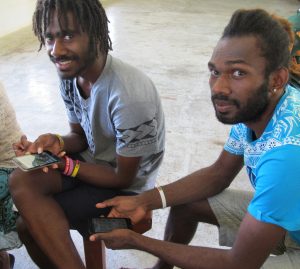 Getting records back to the places they came from is a major motivation for what we do at PARADISEC. Repatriation of unique analog artefacts is an important model, and digital records should, in principle, be easier to move to any place. However, not every place has capacity for access to or storage of digital files. In the Pacific there are few reliable digital repositories and the cultural agencies I know have little capacity to store or disseminate digital files. Internet connections are usually expensive and so discourage download of large files.
Getting records back to the places they came from is a major motivation for what we do at PARADISEC. Repatriation of unique analog artefacts is an important model, and digital records should, in principle, be easier to move to any place. However, not every place has capacity for access to or storage of digital files. In the Pacific there are few reliable digital repositories and the cultural agencies I know have little capacity to store or disseminate digital files. Internet connections are usually expensive and so discourage download of large files.
Earlier I talked about using Itunes to get records back to Erakor, the village where I work in Vanuatu. The computers that held the Itunes installation eventually stopped working and were replaced, but the language files were not copied over to the new computers.
Providing recordings on hard disks or usb drives may be appropriate for cultural centres, but is not very effective for the speakers who typically do not have computers.
 An interesting way of making files available is by providing them on a local wifi network that can be picked up on mobile phones which are almost ubiquitous, certainly in Vanuatu. Ideally this is connected to the internet, but in many places it is too expensive to get this kind of access.
An interesting way of making files available is by providing them on a local wifi network that can be picked up on mobile phones which are almost ubiquitous, certainly in Vanuatu. Ideally this is connected to the internet, but in many places it is too expensive to get this kind of access.
I heard about librarybox at an archiving conference, it is a local wifi transmitter on which you can put files for local delivery. It does not need an internet connection as it is a self-contained server and transmitter. Putting files onto this device makes them accessible to anyone with a wifi receiver (phone, computer, tablet) in range. The storage is a usb flashdrive, so is limited by the size of that drive. It has a battery that can be charged via a normal usb charger.

I found that once there are more than a few files to be delivered then it would be useful if there were a catalog so that users know what they are looking at and what the files contain. As PARADISEC items all have a copy of their catalog information stored with them in an xml file, it is possible to create a sub-collection by downloading item directories from PARADISEC. All catalog information is harvested from these directories using a tool I had written by Marco La Rosa and it generates a directory of the files presented on the librarybox.

I tried this out in a few places in Australia, and last week took a collection of my Nafsan records to their source community in Erakor village, Vanuatu. As you can see from the photos, the files could be found on anyone’s smartphone, and media could be seen, played or downloaded.
What is the possibility for extending use of this wifi transmitter system? A single transmitter could be put into a cultural centre plugged into power and so making the archival records available at the local level.
Now we need to make a number of our own libraryboxes (they helpfully provide instructions here) and then send them to be set up in museums and cultural centres in the Pacific.
 Follow
Follow
Sounds like the libraryboxes need to be configured to sync/diff at the subset level and provide sync information against a master database when a connection is flagged as being available for use – a lot of the tools developers have been using to ensure systems like Bitcoin exchanges work properly could be wonderful here to keep the libraryboxes from being just as out of date as the HDD/USB options – and the issue with the librarybox solution is that it’s just a ‘named’ wifi server that goes away as soon as you do without the infrastructure to support it – the very infrastructure that it’s being presented as a solution to the lack of.
So it’s interesting, great from a UI/UX perspective, but perhaps needs partnering with Li-Ion/LiFePO4 batteries or similar and deploying as a stand-alone example with a fairly rugged touchscreen plus a built in manual and WPS.
Note that the current version of this work is using raspberry pi, as librarybox is no longer in production. https://www.raspberrypi.org/
We are now producing these units and have published instructions here: http://www.language-archives.services/about/pi
Unlike LibraryBox, the new units are not self-powered, so they need to be plugged in to mains power to work.
We found that, when there are too many users, they cannot connect to the Raspberry Pi. At the Honiara workshop (http://www.paradisec.org.au/blog/2019/08/honiara-language-workshop-august-2019/) with 90 + people, we had to ration access to make it work.